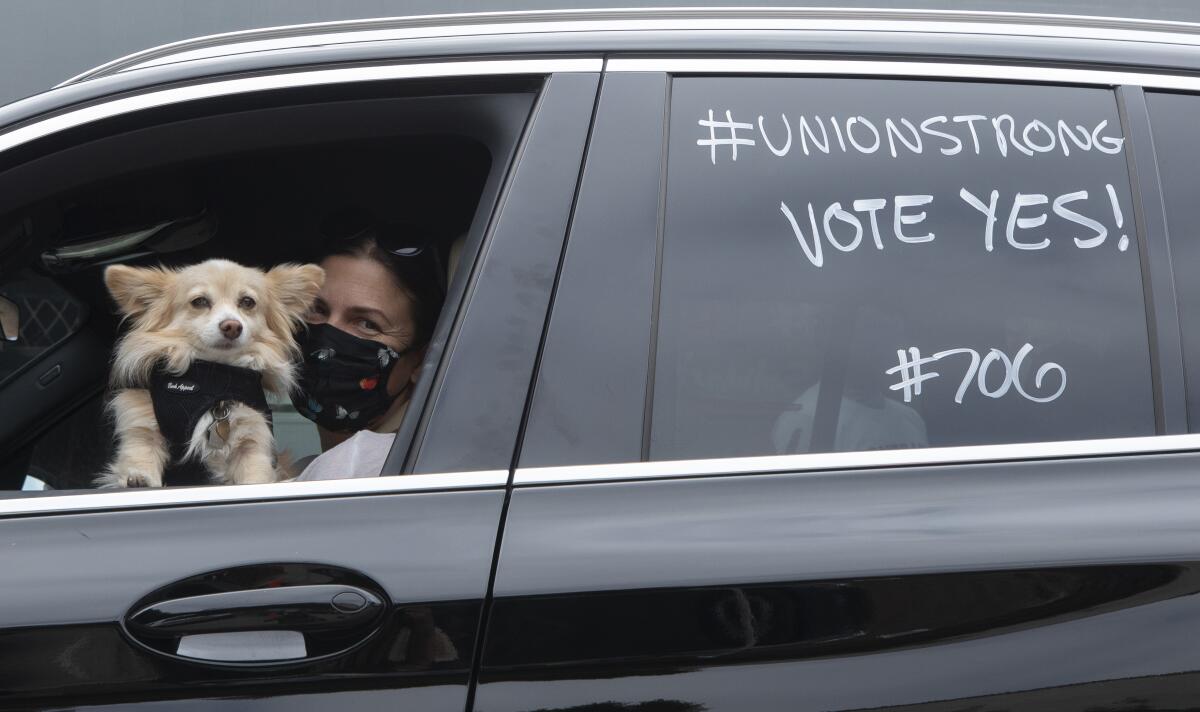Hollywood crews give near unanimous support for strike authorization after contract talks stall

Hollywood crews have voted overwhelmingly in favor of waging a strike if their union cannot agree to a new contract, setting the stage for an extraordinary showdown with the major studios.
The International Alliance of Theatrical Stage Employees said 52,706 members or nearly 99% of those who cast ballots voted in favor of a strike authorization. The turnout was unusually high, with 90% of eligible union members participating in the vote, IATSE said.
Union members representing some 60,000 film and TV workers have been casting their votes since Friday to authorize their leaders to call a strike if they can’t reach an agreement with producers on a new three-year contract.
The extraordinary vote comes after months of talks with the Alliance of Motion Picture and Television Producers — which represents the major studios and streaming companies — reached an impasse.
“The members have spoken loud and clear,” IATSE President Matthew Loeb said. “This vote is about the quality of life as well as the health and safety of those who work in the film and television industry.”
The AMPTP said it was committed to finding a deal to avoid a production shutdown at a critical time.
“A deal can be made at the bargaining table, but it will require both parties working together in good faith with a willingness to compromise and to explore new solutions to resolve the open issues,” the alliance said in a statement Monday.
The vote doesn’t mean a strike is inevitable, but the near unanimous show of support does give union leaders potentially more leverage in contract negotiations with employers, who might be willing to make concessions for fear of disruptions caused by a walkout.
Loeb informed the Alliance of Motion Picture and Television Producers (AMPTP) of the election results Monday morning, saying he “emphasized the need for the studios to adequately address the union’s core issues.”
Nonetheless, the step is highly unusually for IATSE, which historically has avoided confrontations with studios in order to keep its members working. The union has not authorized a nationwide strike in its 128-year history.
Hollywood crews last staged a major strike in 1945, when workers held a series of walkouts outside Warner Bros. and other studios in a protest known as Hollywood’s Bloody Friday.
A walkout would halt production nationwide and deliver a blow to one of Southern California’s most important industries. It would disrupt efforts by the major studios to resume production activity that was delayed by the pandemic, and to feed a growing demand for content from their new streaming platforms.
Over the past few weeks IATSE members have been mobilizing support for the vote with campaigns on social media, circulating petitions and garnering public support from celebrities including Jane Fonda and Mindy Kaling, as well as California legislators.
Crews in Los Angeles have held car-painting campaigns, covering their vehicles with logos and slogans to show their solidarity.
The vote required 75% of the membership of each local to approve the authorization for it to pass. That threshold was met in all 36 union locals, with none reporting less than 96% voting in favor to authorize a strike, IATSE said.
Union leaders sought the authorization after four months of increasingly acrimonious talks between the union and the AMPTP failed to result in a new contract. Negotiations are set to resume Tuesday morning, said one person familiar with the talks who was not authorized to comment.
The union said earlier this month that the producers alliance has not been willing to negotiate terms it wants to improve the working conditions and compensation of its members. Specifically, the union is seeking improved pay, especially for streaming productions; more rest periods to reduce long hours of filming; and higher contributions to the union’s health and pension plans.
Studios have balked at the union’s demands, after having to incur massive costs as a result of new safety requirements and delays due to the coronavirus pandemic. The AMPTP said previously that it had addressed many of the union’s demands, including increasing minimum pay rates for some types of new-media productions and covering a nearly $400-million pension and health plan deficit.
IATSE leaders are negotiating two contracts simultaneously for crews on the West Coast as well as nationally. The two contracts lapsed on July 31 and were extended to Sept. 10.
More to Read
Inside the business of entertainment
The Wide Shot brings you news, analysis and insights on everything from streaming wars to production — and what it all means for the future.
You may occasionally receive promotional content from the Los Angeles Times.











